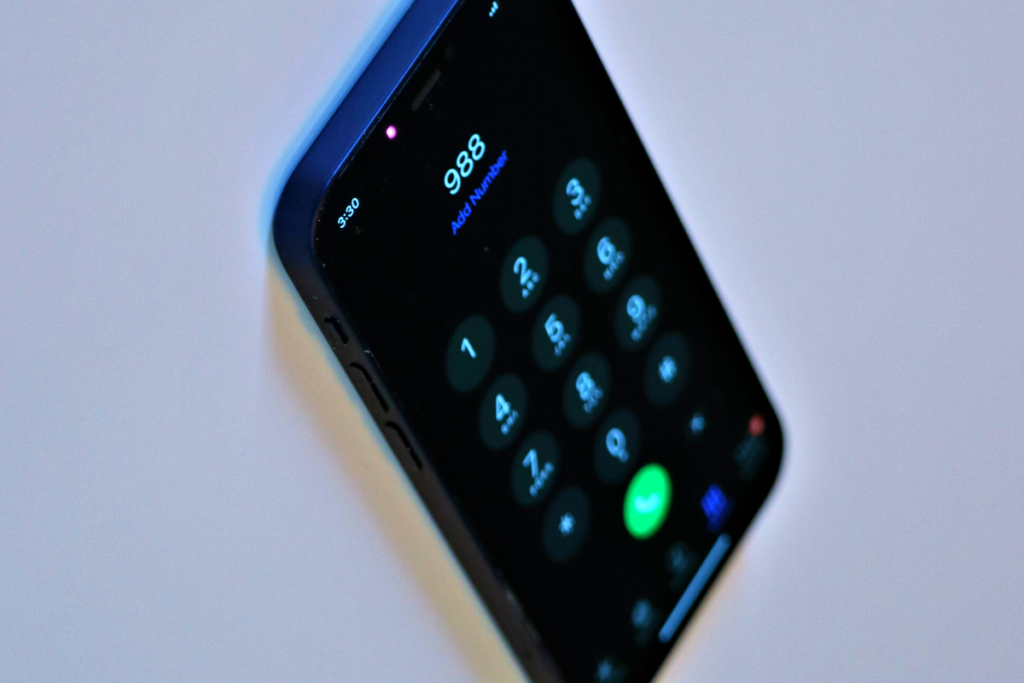A year ago, a new three-digit phone line launched nationwide, making it easier for people facing a mental health crisis and other issues to find resources and support.
Since then, national data show that more people are reaching out to what’s called the 988 Suicide and Crisis Lifeline. Yet call counselors and call center managers in Maryland want more people to be aware of the line and how it can help.
The 988 Lifeline — previously called the National Suicide Prevention Lifeline — had been ten-digits long. But in 2020, a new federal law required the phone number to be changed to 988 and that it be designated as the national suicide and mental health crisis hotline.
Chris Niles, senior hotline counselor with the Baltimore Crisis Response, said that the three-digit number is easier to remember, especially when people are in crisis and may not be in the clearest mindset.
“When your house is on fire, you’re in a car accident, someone steals your purse, it’s real easy to remember ‘I call 911,’” Niles said. “But when you’re experiencing extreme depression or suicidal thoughts, grieving the loss of a loved one, memorizing an 800-number when you’re in that type of emotional distress is probably not the easiest thing.”
“So, when they established 988, they made it so much easier for people reach out and get the help that they need,” he said.
The 988 line has been active nationwide for a year as of July 16, and 26 states have passed laws and appropriated funds to support the line, according the National Academy for State Health Policy.
That includes Maryland. In the 2022 session, Gov. Larry Hogan (R) approved Senate Bill 241/House Bill 293, which established a fund for the program. In 2023, Gov. Wes Moore (D) approved Senate Bill 3/ House Bill 271, which carved out $12 million for the 988 fund in the 2025 budget.
In addition, the 988 line has a new LGBTQ+ pilot program that focuses on connecting that population to resources and counseling specific to their struggles.
The original number, 1-800-273-8255, “will always remain available to people in emotional distress or suicidal crisis,” according to the 988 Lifeline website.
In the year since the 988 line’s launch, Niles with the Baltimore Crisis Response has noticed an increase in callers who are looking for support while facing housing instability, as COVID-era federal support comes to an end even when many are still struggling to make ends meet.
Just last week, he spoke with an elderly woman who was recently evicted.
“Her story is pretty commonplace here. When the eviction restriction moratorium from the White House was lifted … she was one of many in Baltimore City that wasn’t able to pay. And the landlord ended up evicting once they were allowed to,” he said.
“And now she’s living, alternating between the street and a hotel. And so she was calling and asking for information on different shelter programs, different programs to help her get into an apartment and also local resources for food and whatnot,” he added.
Niles noted that people will call the 988 lines when they are in less dire situations as well.
Amid the COVID-19 pandemic, he noticed an increase in people calling to talk about their interpersonal relationships, with family members or with partners, as the pandemic led people to spend more time at home.
He also noted that some people will call if they have stress at work.
“They’ll ask ‘Is it okay that I’m calling? I’m not suicidal – I just had a really crap day at work and want someone to talk to.’ And we tell them ‘of course.’” Niles said.
Niles explained that the types of calls will determine what resources will be most helpful for the person in crisis. Many calls are just looking for information on resources that are available.
Others may need community intervention, he said, which is typically addressed by a mental health team sent out from a crisis center. Law enforcement is not usually involved unless it’s absolutely necessary.
According to national data from the federal Substance Abuse and Mental Health Services Administration, answered calls to the 988 line increased by 45% in May 2023 compared to May 2022, before the 988 Lifeline launched. Online chats for the crisis line saw an increase of 52% from May 2022 to May 2023.
But the largest percentage increase in people reaching out to the crisis line came in the form of text messages. From May 2022 through May 2023, the percentage of texts answered increased by 938%, according to SAMHSA data.
Dan Rabbit, policy director at Behavioral Health System Baltimore, which oversees the 988 and crisis services for the Central Maryland region, has seen similar increases locally.
“That explosion in text messages — not many people texted it before, so [it’s] starting from a lower number, but still — that little increase is astounding,” he said. “And that way of contacting 988 is more popular with younger people. So, it’s a sign that young people are hearing about this and are using our services to get the support they need.”
Rabbitt said that the 988 line has made a lot of progress in the year since it launched and he is excited to see how it will continue to “transform how Marylanders receive care for their mental health challenges.”
“988 counselors are here to help anyone, regardless of the intensity or the acuity of whatever is concerning them,” he said. “So there’s no wrong reason to call.”
By Danielle J. Brown



Write a Letter to the Editor on this Article
We encourage readers to offer their point of view on this article by submitting the following form. Editing is sometimes necessary and is done at the discretion of the editorial staff.